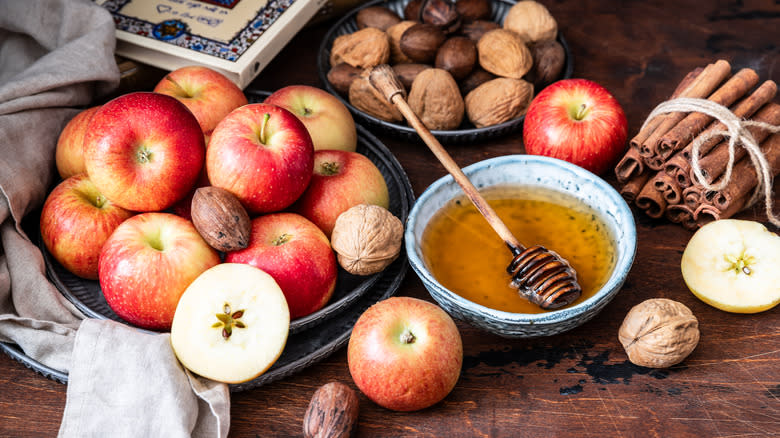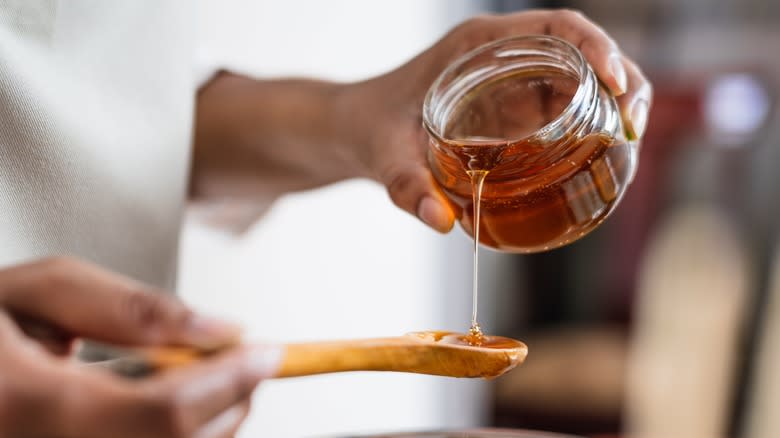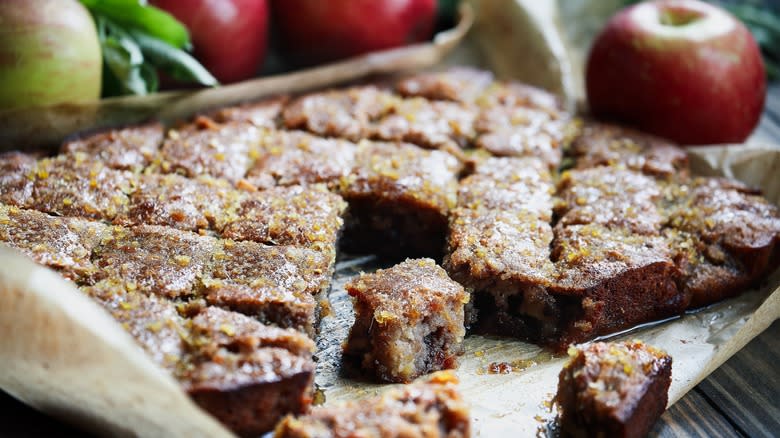The Type Of Honey You Serve At Rosh Hashanah Matters More Than You Think

Also known as the Jewish New Year, Rosh Hashanah is a holiday that celebrates the genesis of the world in the Jewish faith. This High Holy Day falls on September 15 this year, and many families commemorate the event by enjoying traditional foods like potato kugel, brisket, and challah bread. Many families also partake in the culinary tradition of dipping apples and challah into honey during Rosh Hashanah, which symbolizes their hopes for the coming year. There are numerous varieties of honey available; some are better suited to Rosh Hashanah celebrations than others -- and it all boils down to consistency.
For some insight into honey selection, Daily Meal Consulted with Rodger Bowser of Zingerman's Deli in Ann Arbor, Michigan. As the company's head chef and managing partner, Bowser is fully equipped to help people develop their ideal Rosh Hashanah menus. He also has a lot to say about honey selection and why common varieties of this sweet condiment aren't always the best option for the holiday.
Read more: 12 Condiments That Don't Need To Be Refrigerated
Texture Is Key When Dipping Apples And Challah

As explained by Rodger Bowser, "Honeys can come in many different textures, and some are a smooth, silky liquid that easily pours out of the jar and has no crystallization, while others are thick and rich with an almost fudgy or chewy texture." The head chef considers the latter option perfect for Rosh Hashanah pairings, noting, "A nice, thick honey will hold onto the apple slice or the challah without dripping off the sides."
Bowser also offers some recommendations for different types of honey. Moon Shine Trading Co.'s Northwestern Meadowfoam Honey provides a rich, smoky flavor that pairs beautifully with sweet apples and challah. There's also Mieli Thun's Lemon Tree Honey, which features a dense texture and citrus undertones. Creamed honey is another excellent option when aiming for a richer, thicker texture. It's often used as a spread for toast and bagels, which means it pairs beautifully with challah.
Conversely, buckwheat honey might not be the best choice for Rosh Hashanah. Along with its thin texture, buckwheat honey also has an intense flavor. While it meshes well with many baked goods, the selection is likely to overwhelm the delicate sweetness of apples and challah. Although it has a milder flavor, clover honey should also be avoided due to its thinness.
Tips On Thinning Out Honey That's Crystalized

When incorporating honey into recipes, thinner is better, according to Rodger Bowser. Thinner honey excels in recipes because it's generally easier to manage. Less viscous varieties can be easily poured and incorporated with other ingredients to infuse baked goods with a bit of wholesome sweetness. Bowser's current go-to selection is Trea's Greek Wildflower Honey, which he describes as having a "light butterscotch flavor that is delicate, almondy, and maybe has a hint of cantaloupe."
Over time, honey naturally crystallizes, making it much harder to work with. Fortunately, Bowser has some smart tips on restoring crystalized honey to its pourable state (which would be necessary when creating a Rosh Hashanah dessert like honey cake with apple confit). Simply fill a pot with hot water and submerge the jar of honey to rejuvenate its smooth texture. If the honey is especially crystallized, it may be necessary to do this multiple times. With Bowser's wise guidance on honey selections, your Rosh Hashanah spread is all but guaranteed to be one for the record books.
Read the original article on Daily Meal.

